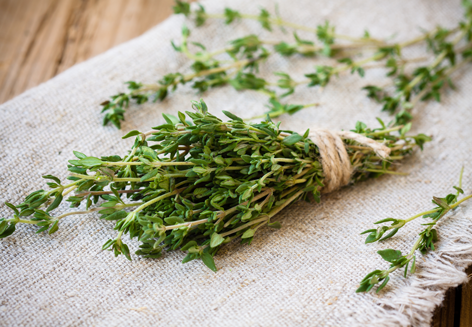Thyme is my favourite herb for the winter season.
Thyme has been used as a herb and a medicinal plant for more than 4000 years. Its healing power is used especially in inflammations of the respiratory tract, the airways, such as colds or coughs.
Both the common thyme and the Spanish thyme have an antispasmodic effect on the bronchi, they are anti-inflammatory and they help to cough up phlegm. They are both effective against bacteria, fungi and viruses.
The main ingredients of the essential oil the Thyme herb contains are thymol and carvacrol. Other ingredients of thyme include phenolic monoterpenes, flavonoids, saponins and tannins.
The use of thyme is therefore medically recognised and recommended against inflammation of the upper respiratory tract, for example colds with cough, and symptoms of bronchitis.
In folk medicine, the medicinal plant is also used, for example, for laryngitis, asthma, indigestion (such as mild abdominal pain, bloating and flatulence), chronic gastritis and skin problems such as itching.
How is thyme used?
The herb can be used in various ways:
- as a tea (or infusion)
- as an inhalation
- in a bath
How to prepare a thyme tea:
The general mix is one teaspoon of dried thyme brought to the boil with about 300ml of water, let it infuse for 10-15 minutes and then strain the plant parts.
- You can drink the tea and you could add other medicinal plants to this tea.
- You can rinse the mouth or gargle against a sore throat
- You can treat skin problems caused by bacteria, viruses or fungi with a compress made of a 5% (five percent) infusion of thyme herb. It’s easy to make such a solutions: all you need is 5 g of the herb and add 100 g of water.
- If you have a cold or cold, you can take a full bath: pour 100 grams of dried thyme herb with a litre of hot water, let the infusion stand for ten minutes, then strain it and pour it in the bath water.
- You can also inhale thyme if you suffer from a cough with tight mucus.
How to inhale with Thyme:
- Bring 1 tablespoon of dried thyme with half a litre of water to a boil and and let the mixture cool for a few minutes.
- Then lean over the bowl with a towel over your head and inhale the hot steam. If the steam is too hot, ventilate the towel occasionally.
- CAUTION: Never leave a child alone with a bowl of hot water for inhalation and take a small child on your lap while inhaling!
- A safer way to inhale using thyme is using an inhalation nebuliser.
I personally have been using thyme in a cough mixture for more than 20 years. Thyme cough mixtures and syrups taste good and are particularly popular with children. You can buy ready-made cough syrups in pharmacies. But you can also make your own thyme cough syrup quickly and without much effort. And this mixture is safe to give to children older than one year.
You need:
- 1 large onion
- 1 teaspoon dried thyme
- 1 teaspoon of sage
- 300ml water
- 2 tablespoons brown sugar or honey
How to prepare it:
- Bring the water together with the thyme and the sage to a boil.
- Add the sugar or honey and stir until dissolved.
- Add the finely chopped onion and let infuse for approximately 10-15 minutes.
How to administer it:
- Give your child 1 tablespoon (or a small egg cups full) of the cough mixture 2-3 time per day
- Store in a sealed jar (I use a clean jar jar) in the fridge for up to 3 days.
Does Thyme have any side effect?
Very rarely hypersensitivity reactions such as shortness of breath, skin reactions or swelling can occur. Also rarely observed are stomach complaints when thyme is used internally.
Are there any dangers when using Thyme?
- Thyme should not be used, inhaled or consumed by anyone who is allergic to thyme or other members of this plant family (sage, mint, peppermint, lavender, etc.).
- When used as an essential oil, thyme can cause life-threatening cramping (glottis spasm) with respiratory arrest in infants and toddlers up to 2 years of age. You should therefore not use thyme in this form in this age group.
- In general, the use of essential oils in babies and children should always be discussed with a doctor or pharmacist first. Especially camphor, eucalyptus, thyme and peppermint oil can be dangerous if used in children under three years.
- It is not known what effect thyme may have on pregnancy or breastfeeding and it is therefore not recommended to use essential thyme oil during these times.
- Do not use thyme or thyme oil in full baths if you have large wounds, severe infections, or heart conditions.
- Do not apply essential thyme oil directly on to skin, mucous membranes or around the eyes.
- Do not use essential thyme oil over a prolonged time and large-scale inunctions.
Posted on December 14, 2019 by Luitgard Holzleg
This entry was posted in Blog and tagged inhalation nebuliser. Bookmark the permalink.

